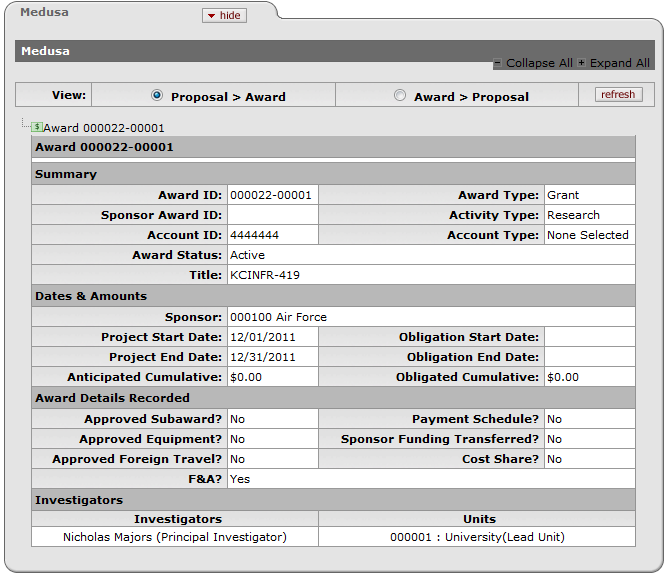Medusa
Medusa is the name of a tabbed section found on multiple e-docs in KC (or a tabbed section on a tabbed page of the same name). It functions as a relational cross-reference, allowing unique viewing options when different types of e-docs are associated with each other. When other e-docs are associated with the e-doc you are currently viewing, Medusa allows you to view fields of information (for example, important identifying information, dates, and amounts) from those related e-docs. It also allows you to click links to navigate directly to those other e-docs if you so desire.

Figure 70 Medusa – a tabbed section in Proposal > Award display (Example)
• Dynamic Summary Information Display: Additionally, it allows for viewing of summarized information or key information that is “brought in” from those other associated e-docs. In other words, the information resides elsewhere (different e-docs) but is dynamically pulled in to the currently-accessed e-doc for viewing.
• Hierarchical Viewing Tools: In some cases, multiple e-docs are related to each other in a hierarchical fashion. Medusa utilizes an expandable/collapsible tree view (a.k.a. the Medusa hierarchy tree) with +/- (plus/minus) tools and graphical icons to show and/or hide folders (directories) in each branch. These may include Proposal Development, Institutional Proposal, Negotiation, Award, or Subaward documents.
• Navigation To Related E-Docs: Links to the related documents are provided for convenient navigation. The tree lists allow you to make selections and click links that access other pieces of system functionality (for example, an award hierarchy, and the direct opening of other e-docs).
• Viewing Of Notes: Notes buttons allow you to navigate to and view the Notes subsection of a related e-doc by directly taking you to that section of that e-doc. Depending on your browser settings, this could be in a new popup window or a new tab within the same browser window.
|
|
Unsubstantiated reports that viewing Medusa in KC for too long has caused some users to turn to stone are considered myths as of the time of this publication. KC testing has confirmed with reasonable certainty that failure to avoid prolonged viewing of a KC Medusa tree does not potentially result in petrifacation. |
